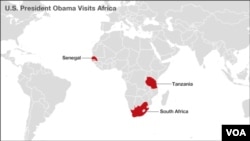DAKAR —
U.S. President Barack Obama kicks off his three-country Africa tour in Senegal on June 26. The West African nation is a key U.S. ally and an anchor of stability in a region plagued by terrorism, military coups and transnational crime. The president's visit is seen as a nod to Senegal's democratic track record, and what analysts say are ongoing strides by its government to increase transparency and crack down on corruption.
Obama visits Senegal a little more than a year after a hotly contested presidential race tested the country.
That election in 2012 began with deadly street protests against the incumbent's unconstitutional bid for a third mandate, but ended with a peaceful, transparent vote, and the country's third democratic handover of power since independence in 1960.
Senegalese are well aware of their accomplishments, but say Obama's visit is an honor all the same.
"What would be ideal is to not need people to come from the outside to tell us, 'yes, you are a good democracy, you are good students.' But it still makes people happy. It's Obama. He's a busy guy. It's an honor," said rapper Keyti.
West Africa Research Center Director, Ousmane Sene, said Obama's visit will "reinvigorate" progress being made in Senegal.
"His visit shows that this country, as little as it is, matters. Senegal has only 12 million inhabitants… and I don't think Senegal's economy is even as big as New York City's. We are small compared to the United States, but what we can bring to the world is something else entirely," said Sene.
Obama has only made one other trip to sub-Saharan Africa as president, to Ghana in 2009. He called for better governance.
"Africa does not need strongmen. It needs strong institutions," he said.
Soccer coach Ady Ndoye said Obama has a certain influence with African leaders and should use it more.
"Not necessarily giving them lessons but rather instilling in our presidents a way to run their countries that benefits everyone, not just the leaders and their families," said Ndoye.
Major challenges remain in Senegal. Young people here say they would tell Obama about how hard it is to pay for school or find a job.
"We had hope with the new government, but we still don't have jobs. We are still here waiting. We need a new way to get there," said Ousmane Ndaw.
"We want our country to be rich," said Ndeye Aram.
Africa has the youngest and one of the most rapidly growing populations in the world. The White House says meeting with this "next generation" of African leaders is, indeed, on the president's agenda.
Obama visits Senegal a little more than a year after a hotly contested presidential race tested the country.
That election in 2012 began with deadly street protests against the incumbent's unconstitutional bid for a third mandate, but ended with a peaceful, transparent vote, and the country's third democratic handover of power since independence in 1960.
Senegalese are well aware of their accomplishments, but say Obama's visit is an honor all the same.
"What would be ideal is to not need people to come from the outside to tell us, 'yes, you are a good democracy, you are good students.' But it still makes people happy. It's Obama. He's a busy guy. It's an honor," said rapper Keyti.
West Africa Research Center Director, Ousmane Sene, said Obama's visit will "reinvigorate" progress being made in Senegal.
"His visit shows that this country, as little as it is, matters. Senegal has only 12 million inhabitants… and I don't think Senegal's economy is even as big as New York City's. We are small compared to the United States, but what we can bring to the world is something else entirely," said Sene.
Obama has only made one other trip to sub-Saharan Africa as president, to Ghana in 2009. He called for better governance.
"Africa does not need strongmen. It needs strong institutions," he said.
Soccer coach Ady Ndoye said Obama has a certain influence with African leaders and should use it more.
"Not necessarily giving them lessons but rather instilling in our presidents a way to run their countries that benefits everyone, not just the leaders and their families," said Ndoye.
Major challenges remain in Senegal. Young people here say they would tell Obama about how hard it is to pay for school or find a job.
"We had hope with the new government, but we still don't have jobs. We are still here waiting. We need a new way to get there," said Ousmane Ndaw.
"We want our country to be rich," said Ndeye Aram.
Africa has the youngest and one of the most rapidly growing populations in the world. The White House says meeting with this "next generation" of African leaders is, indeed, on the president's agenda.










